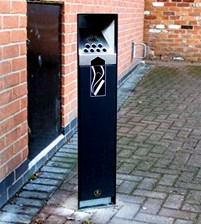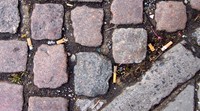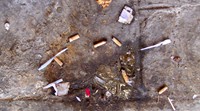|
Cigarette and smoking
materials
Ever since smoking in public places
was banned on 1st July 2007, the number of cigarette ends dropped in the
streets has increased dramatically and they can be found in abundance in
Bourne outside premises where staff have got into the habit of popping
outside for "a quick drag".
Dozens litter the cobblestones outside the Angel Hotel and in other
alcoves, doorways and alleyways along North Street and West Street, and
there are many other spots that also have a large number of discarded
stubs, their owners paying scant regard to the waste bins available at
various vantage points around the town. The car park behind the Corn
Exchange is also a favourite place for the crafty smoker with the
resulting fag ends scattered over the floor, many also dropped by
motorists who have just parked their cars.
But perhaps this unsightly mess may soon come to an end because a special
disposal unit has now been erected by South Kesteven District Council
where smokers can dump their cigarette ends without littering the
pavements. It appears to be a good idea although the council has not yet
got it right because they have sited the new unit immediately against the
back wall of the Town Hall and staff have complained that when the windows
above are opened, as they often are in warm weather, then the fumes will
drift in, thus creating the very situation of passive smoking which the
latest restrictions were intended to avoid.
We hear that similar installations in Grantham, where the councilís
headquarters are situated, have been sited well away from buildings and
staff at Bourne have been promised that their unit too will be relocated.
It is not being used much yet but perhaps the word will soon get around
and the unsightly fag ends now littering our streets will become a thing
of the past. In any case, expenditure on these metal monoliths ought to be
quite unnecessary because dropping fag ends in the street is an offence
under the Environmental Protection Act of 1990 which requires local
authorities to keep the streets clean and free from litter and that
includes smoking-related materials which, according to a recent survey,
are one of the most prevalent types, constituting almost 80% of the
rubbish found in public places over the past three years.
As with vandalism, graffiti and criminal damage which also plague our
town, the answer therefore is not new initiatives but the enforcement of
the old through increased supervision by our law officers. Unfortunately,
cigarette bins are recommended as part of the latest awareness campaign
from Whitehall and so we may expect to see more of them in the future.
If the scheme is a success, then perhaps the next installation can be a
chewing gum disposal unit, thus ending the sticky nuisance that defaces
our pavements, leaving them splattered with blobs and stains, a nuisance
that costs some local authorities (not ours) £200,000 a year to clean up
their streets. In places such as Singapore, the chewing gum menace has
been effectively eradicated with a policy of zero tolerance and visitors
are so aware of the penalties that it is a common occurrence to swallow
your gum on leaving the aircraft rather than be found with it in your
possession.
The dropping of chewing gum in this country is also covered by the act,
although as with the disposal of fag ends, there is no actual
discouragement and the government prefers to jolly people along into
accepting their laws rather than enforce them with the penalties
available, a method that has been proved to be totally inadequate. In the
absence of police supervision therefore, the only other solution is a
little more civic pride and a stigmatisation of the culprits which would
be far more effective but as this appears to be a non-starter, we must
depend on a voluntary code and the use of these disposal units which
appear to be a most unlikely solution.
WRITTEN OCTOBER 2007

Go to:
Main Index Villages
Index
|


